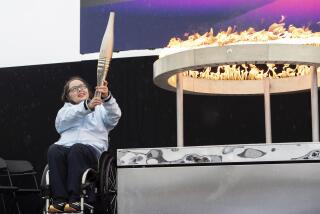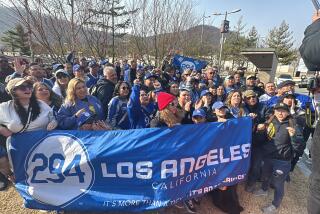TORCH REACHES SEOUL : More Than 50,000 Greet Olympic Flame’s Arrival at Eastern Edge of the City
- Share via
SEOUL — Greeted by a crowd of more than 50,000 persons who filled the sidewalks and hillsides at the city limits, the Olympic Torch reached Seoul Friday.
Helicopters flew overhead, spewing lines of red, yellow, green and white smoke. Other choppers followed, one dropping confetti, another carrying a Korean dressed up as Hodori, the Olympic tiger mascot, waving to the people below.
Crowds surged forward, breaking through police lines as Vice Governor Yoon Se Darl of Kyonggi Province handed over the torch to Seoul Vice Mayor Kim Jin Won in mid-afternoon on the eastern edge of Seoul.
Completing all but the final day and 29 miles of its 2,605-mile, 22-day journey through South Korea, the torch was to touch off a flame Friday night in front of City Hall, the traditional site of welcome for foreign dignitaries. It was expected to draw even larger crowds there.
There it will burn overnight before completing the last 17-mile leg through the streets of this city of 10 million persons to the Olympic Stadium south of the Han River, where the 24th Olympiad will open Saturday. Because of the international time difference, the opening ceremonies will be telecast Friday in the United States.
The plaza in front of the City Hall also was the location of some of the biggest 1987 protest demonstrations that led to the nation’s transformation from authoritarian rule to its initial trappings of democracy.
But Friday, despite continued complaints from small groups of radical students, there were no incidents.
And thousands of Korean women dressed in brilliant-colored chima jogori (traditional skirt and blouse), schoolchildren and ordinary citizens awaited the flame as it came south from Uijongbu through valleys that once were on an invasion route for armies from communist North Korea which launched the bloody three-year fratricidal Korean War in 1950.
Friday, that route was lined by farmers and hundreds of American GIs, a portion of the 42,000 American service men stationed in South Korea, as a guarantee of security against renewed aggression from the North.
Even in areas bordered by rice paddies, the crowds waved flags of South Korea, flags bearing the Olympic symbol and flags showing the Olympic tiger mascot. “Nongakdae,” or farmers’ bands with cymbals and drums and dancers dressed up in their finest traditional clothes, welcomed each runner as the torch was passed along the route. For part of the trip into Seoul, bicyclists carried the flame. At one point, a Korean rock band complete with electric guitars provided entertainment.
Frank Shorter, an American marathon gold medalist in 1972 at the Munich Olympics who also won a silver medal in the event at the 1976 Montreal Games, carried the flame for one segment of the run. He is acting as an announcer for NBC television, which has the rights to telecast the 1988 Games.
Usually stern Korean policemen allowed a foreign reporter to pass in the procession behind the torch bearer with no proper accreditation.
“How did you get in there?” smiling and laughing people shouted at the taxi as it passed.
“Give me a lift to Seoul!” called out a GI standing alongside the road in front of Camp Stanley.
Later, motorcyclists joined the band of cars following the runners--some with two and three passengers.
In central Uijongbu, the crowd stood shoulder-to-shoulder three and four deep. But at the entrance to Seoul, even pedestrian movement was made impossible by the jamming.
More to Read
Sign up for Essential California
The most important California stories and recommendations in your inbox every morning.
You may occasionally receive promotional content from the Los Angeles Times.









